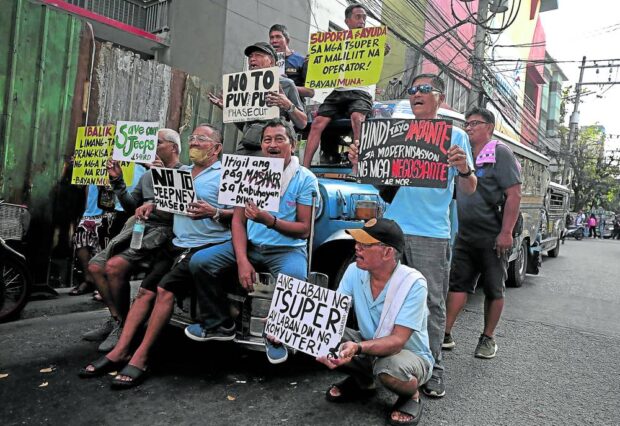LTFRB-Piston talks fail to solve impasse

OPPOSING IMPROVEMENT Members of the transport group Piston try to drum up support for a strike against the government’s jeepney fleet modernization program. —RICHARD A. REYES
A meeting on Thursday between the Land Transportation Franchising and Regulatory Board (LTFRB) Chair Teofilo Guadiz III and Pagkakaisa ng mga Samahan ng Tsuper at Opereytor Nationwide (Piston) president Mody Floranda and other transport group leaders failed to break the impasse between the two parties over the Dec. 31 deadline for franchise consolidation under the government’s public utility vehicle modernization program (PUVMP).
On the first day of the two-day transport strike led by Piston, hundreds of drivers and operators marched to the LTFRB headquarters in Quezon City to protest the looming phaseout of passenger jeepneys.
During a dialogue with Guadiz, transport group leaders voiced their concerns on cooperative management concerns. “Was the dialogue successful? It’s not for LTFRB to say,” LTFRB spokesperson Celine Pialago told reporters afterward.
Piston, on the other hand, issued a statement after the meeting in which it called out the LTFRB and Malacañang for refusing to claim responsibility for the thousands of drivers and commuters who would be affected after the Dec. 31 deadline.
READ: Piston threatens to camp out in front of LTFRB until demands met
The transport group said it was told by the LTFRB that there was nothing it could do since President Marcos had refused an extension. “It’s clear that President Marcos does not care about the thousands of livelihood that will be destroyed starting January 2024,” Piston stressed.
Earlier this week, Mr. Marcos said the Dec. 31 deadline for the consolidation of PUV operators would not be extended. “Adhering to the current timeline ensures that everyone can reap the benefits of the full operationalization of our modernized public transport system. Hence, the scheduled timeline will not be moved,” he added.
‘Misleading’
Piston, however, described as misleading the government’s claim that 70 percent of operators had already been consolidated because the figure covers all types of PUVs, including buses. Only 26 percent of passenger jeepneys and 36 percent of UV Express taxis in Metro Manila have so far been consolidated, it said.
“They would not admit that over 140,000 of drivers and 60,000 operators will lose their livelihood because of [their insistence on implementing] the consolidation,” the group added.
The first day of Piston’s transport strike affected over a thousand commuters in parts of Metro Manila who found it hard to get a ride. The Metropolitan Manila Development Authority said that as of 5 p.m. on Thursday, 56 standby vehicles had been dispatched to ferry 1,318 stranded passengers in Pasig, Muntinlupa and Manila.
A group of researchers from De La Salle University (DLSU), meanwhile, underscored the need to have a strategic pilot test of the PUVMP before its full implementation nationwide. “This pilot testing should involve systematically selecting pilot areas and documenting the practices and issues of jeepney modernization,” said the policy brief published by the DLSU Jesse M. Robredo Institute of Governance earlier this month.
Lessons from the pilot test could support the design of a “revised, more comprehensive and contextualized program,” the researchers argued, adding that it should likewise be a chance to test and document the program’s proof of concept.
Some PUV drivers and operators are worried about the hefty cost of the modern vehicles that cost more than P2 million, as well as the possible monopolization that may happen in certain routes.
‘Unrealistic timelines’
According to the DLSU paper, the modernization program was implemented with “unrealistic timelines and objectives to fulfill” considering the current resources available for the government and the transportation sector.
In 2017, the Department of Transportation implemented the PUVMP through Order No. 2017-011. Among others, the program aims to modernize the public transportation sector and calls for PUVs 15 years old or older to be replaced with modern vehicles. The program was supposed to be completed by 2020 but the COVID-19 pandemic prompted the government to delay its implementation.
Earlier in March, the LTFRB extended the validity of the provisional authorities or franchises of traditional jeepneys from June 30 to Dec. 31 to give individual operators more time to consolidate into corporations or cooperatives and participate in the PUVMP.
This was after transport groups Manibela and Piston staged a three-day nationwide strike to call for reforms in the PUVMP. Industry consolidation, the first step in the modernization program, is aimed at establishing transport cooperatives and legal entities that will be entitled to benefits like government subsidies and access to credit facilities.
These groups will be tasked to help modernize the PUVs and manage the units in a “systematic and predictable manner.”